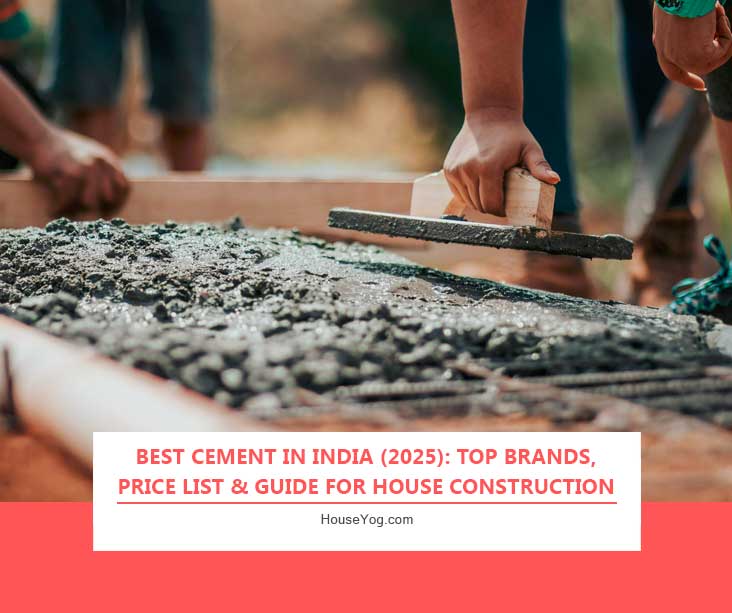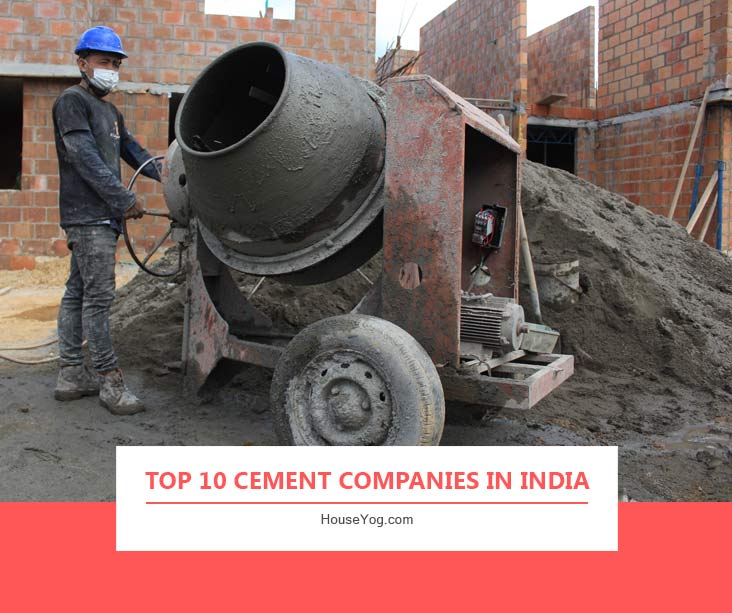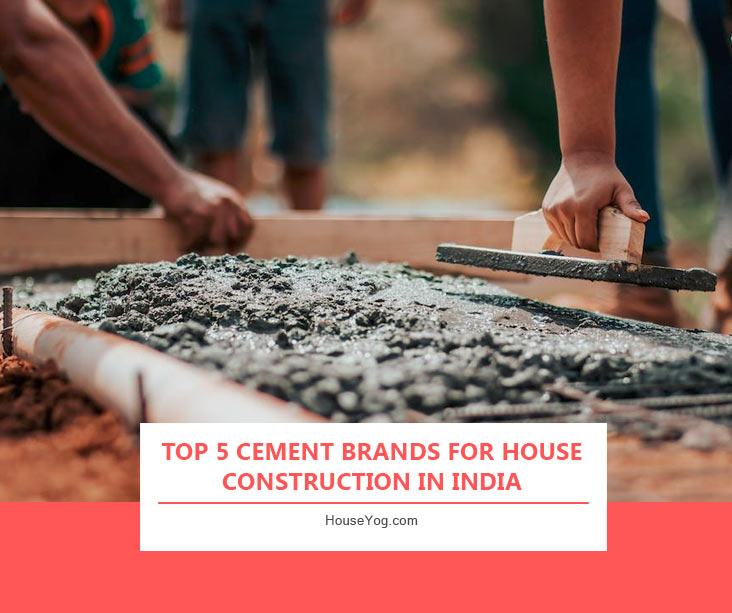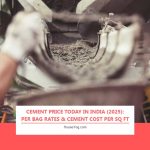When you’re building your dream home, one of the biggest confusions is: Which cement should I use? With so many cement brands in India, Ultratech, ACC, Ambuja, Shree, Dalmia, JK Lakshmi, and more, each offering multiple grades like OPC 53, PPC, PSC, and premium variants such as Ultratech Super or ACC Gold, choosing the right one can feel overwhelming.
The good news is, if you understand the different cement types, top brands, and price ranges in India (2025), the decision becomes much easier. Using the right cement ensures your house is strong, durable, and long-lasting..
In this guide, we’ll help you understand the best cement in India (2025), compare top brands, prices, and use cases, and give you expert tips to make the right choice of cement.
Top Cement Brands in India (2025)
When building your dream home, choosing the right cement brand is just as important as selecting the right type of cement. India has more than 20 cement manufacturers, but in reality, only a few brands dominate the residential construction space due to their consistent quality, nationwide availability, and trusted performance.
Homeowners often get confused because each company offers multiple grades and sub-brands (like ACC Gold, Ultratech Super, Ambuja Plus, etc.). To make things simpler, here’s a list of the top cement companies in India (2025) that are most trusted by contractors, engineers, and homeowners, along with their key strengths, common uses, and average price range.
Ultratech Cement
- India’s largest cement producer.
- Popular variants: Ultratech Super, Ultratech Premium, Ultratech Weather Plus.
- Best for: RCC, foundation, and large-scale residential projects.
ACC Cement
- One of the oldest brands in India.
- Variants: ACC Gold, ACC F2R Superfast.
- Best for: Strong foundation and premium finishing.
Ambuja Cement
- Known for sustainability and durability.
- Best for: General home construction and plastering.
Shree Cement
- Fast-growing brand, affordable pricing.
- Best for: Cost-conscious homeowners looking for reliable strength.
Dalmia Cement
- Strong presence in South & East India.
- Variants: Dalmia DSP, Dalmia Vajram.
- Best for: Coastal construction, water resistance.
JK Lakshmi Cement
- Known for PPC and blended cement.
- Best for: Masonry and plastering.
Ramco Cement
- Popular in South India.
- Best for: Plastering and finishing works.
Regional Players (Bangur, MP Birla, Star Cement, etc.)
- Competitive pricing in Tier-2 & Tier-3 cities.
- Suitable for homeowners balancing budget with quality.
Cement Price in India (2025)
Here’s the average cement price in India (2025), across leading brands and major cities, so you can compare easily before buying.
Average Cement Price per Bag (50 kg)
| Brand Name | Price Range (₹ per 50 kg bag) | |
| ADD SMALL LOGO | Ultratech | ₹370 – ₹390 |
| LOGO IMAGE | ACC | ₹365 – ₹385 |
| Ambuja | ₹360 – ₹380 | |
| Shree Cement | ₹350 – ₹370 | |
| Dalmia Cement | ₹355 – ₹375 | |
| JK Lakshmi | ₹345 – ₹365 | |
| Ramco Cement | ₹350 – ₹370 | |
Prices are approximate retail rates in January 2025; they vary slightly by dealer and location.
City-Wise Cement Price Variation (Approx)
| City | Avg. Price per 50 kg Bag (₹) |
| Delhi | 360 – 380 |
| Mumbai | 370 – 390 |
| Kolkata | 350 – 370 |
| Bangalore | 365 – 385 |
Before you finalise, remember: availability and price may vary by city and dealer. That’s why it’s smart to compare at least 2–3 top cement brands’ prices and availability locally before placing bulk orders. It ensures you get the best balance of price, quality, and timely supply for your project.
Which Cement is Best for House Construction in India?
Homeowners often ask: “Which cement brand or grade should I use for my house?” The truth is, there’s no single “best cement”; it depends on your purpose, budget, and location. Here’s a quick guide:
- For RCC, beams, slabs & foundations → OPC 53 Grade
(Brands: Ultratech, ACC, Ambuja). Offers high early strength and durability, making it ideal for load-bearing structural elements. - For plastering, walls & masonry → PPC
(Brands: Shree, JK Lakshmi, Ramco). Provides smoother finish, better workability, and reduced shrinkage cracks. - For coastal areas & water-prone zones → PSC
(Brands: Dalmia, Shree Cement). Highly resistant to sulphate and chloride attacks, perfect for durability in harsh conditions. - For budget-friendly homes → Regional brands
(Brands: Bangur, MP Birla, Star Cement). Affordable and locally available, while still meeting ISI/BIS standards. - For premium homes → Branded variants
(Examples: Ultratech Super, ACC Gold, Ambuja Plus). Designed for higher finish quality, longevity, and performance in modern homes.
Material cost can vary widely by brand. For a full picture of your budget, check our guide on the overall house construction cost in India. For best results, avoid mixing too many cement brands in the same project. Stick to 1–2 reliable brands for consistency in strength and finish.
Why Choosing the Right Cement Matters for Home Construction
Cement is truly the backbone of any house construction. It holds together sand, aggregates, and steel reinforcement, ensuring the structure is safe, durable, and long-lasting. If you compromise on the quality of cement or choose the wrong type for your needs, it can lead to:
- Weak foundations, cracks, and seepage.
- Reduced load-bearing capacity of RCC structures.
- Higher repair and maintenance costs in the long run.
- Shortened life of the building.
That’s why selecting the best cement for house construction in India is not just a matter of price, but of safety and durability.
Before buying cement, always check for these factors:
- ISI Mark & BIS Certification
- Ensure the cement bag has the ISI mark and complies with the Bureau of Indian Standards (BIS). This guarantees that the cement meets Indian quality benchmarks.
- Fresh Manufacturing Date
- Cement loses strength if stored for too long.
- Ideally, buy cement bags that are not older than 60–90 days from the manufacturing date.
- After 3 months, cement starts losing strength gradually due to moisture absorption.
- After 6 months, the loss of strength can be up to 20–30%, making it unsuitable for critical structural works.
- Packaging Condition
- Check that the bag is sealed properly and not torn.
- Avoid bags with lumps, which means the cement has absorbed moisture and partially set.
By checking these simple things, you can be sure you’re using high-quality cement that gives your home the strength to last for decades.
Types of Cement Used in House Construction
Ordinary Portland Cement (OPC)
- Available in 33, 43, and 53 grades.
- OPC 53: High strength, best for RCC works (slabs, beams, columns, foundations).
- OPC 43: General construction, flooring, and plastering.
Portland Pozzolana Cement (PPC)
- Made by blending OPC with pozzolanic materials.
- Advantages: Higher durability, resistant to chemicals, and less heat of hydration.
- Best use: Plastering, brickwork, finishing, and general residential construction.
Portland Slag Cement (PSC)
- Made using blast furnace slag.
- Benefits: Resistant to sulphate and chloride attacks.
- Best use: Coastal areas, water tanks, and underground construction.
How to Pick the Right Cement for Your Home
Choosing the right cement type is just as important as picking the right brand. A simple rule of thumb is:
- Use OPC 53 Grade for RCC works like beams, slabs, and foundations, where strength is critical.
- Use PPC for plastering, masonry, and brickwork, as it offers a smoother finish and better durability.
- Use PSC in coastal or sulphate-prone areas (e.g., near sea, underground tanks) for maximum protection against chemical attacks.
This quick selection guide ensures you don’t overspend while still getting the best performance for each part of your home.
FAQs About Cement in India (2025)
A. The average price of cement in India in 2025 ranges from ₹345 to ₹390 per 50 kg bag, depending on the brand and city.
A. Ultratech Cement is India’s largest and most popular cement brand.
A. PPC cement (Ambuja, Shree, JK Lakshmi) is best for plastering.
A. It’s better to stick to one brand, but if unavoidable, keep it consistent in each stage (foundation, RCC, plastering).
A. On average, 400–450 bags (depends on construction type & thickness).
A. Regional brands like Bangur, MP Birla, and Star Cement are generally cheaper than premium brands.
A. OPC 53: High strength, fast setting (best for RCC).
PPC: Long-lasting, crack-resistant, cheaper (best for plastering & walls).
Conclusion
The best cement for your house construction depends on your budget, location, and specific requirements. If you want high strength for RCC, go for OPC 53 from Ultratech or ACC. For plastering and walls, PPC from Ambuja, JK Lakshmi, or Shree Cement is ideal. And if you live in a coastal area, PSC from Dalmia or Shree is the safest bet.
Planning to build your dream home? At Houseyog, we help with house design and planning services, right from full architectural services to budgeting, estimating construction costs, and selecting the right materials. Contact us today to learn how we can help.
Don’t miss our full Construction Cost Guide Series for more expert insights. Once your structure is ready, you can also explore our guide on modular kitchen cost in India to plan interiors within budget.
And if you found this guide helpful, please share it with friends or family who might benefit!






